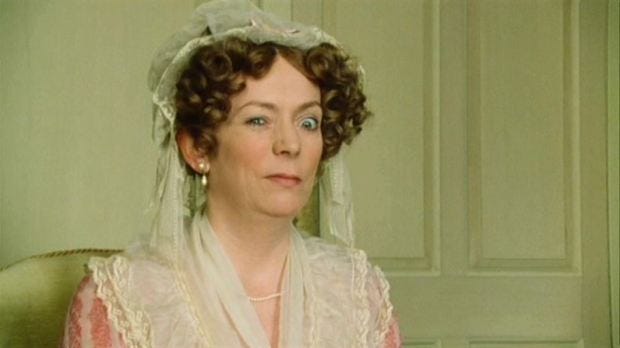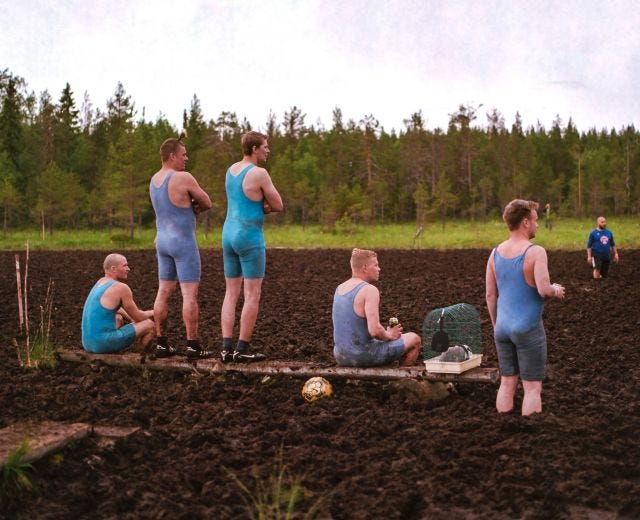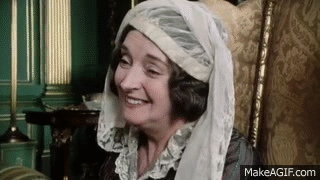The Bluestocking, vol 48: Pride and Prejudice and Wife-carrying
Happy Friday! This week I bring you swamp soccer, Pride and Prejudice and Sadiq Khan. No other introduction necessary, really.
Helen

In defence of Mrs Bennet
Remarkably, even as she shoulders the burden of her family’s future alone, Mrs. Bennet rails against the confines of the misogynistic society she inhabits. When she exclaims angrily, repeatedly, unceasingly about her daughters’ inability to inherit property—“the hardest thing in the world,” she calls it—our heroines, Jane and Lizzie, exhaustedly explain the logic of the sexist concept yet again. “They had often attempted to do it before, but it was a subject on which Mrs. Bennet was beyond the reach of reason, and she continued to rail bitterly against the cruelty of settling an estate away from a family of five daughters, in favor of a man whom nobody cared anything about.” How silly was this mother of theirs, who couldn’t understand the simple, obvious absurdity of a woman inheriting a house.
Last weekend I rewatched all of the BBC version of Pride and Prejudice (because I'm an adult now and no one can stop me) and therefore I have many ~feels~ about this essay. It pains me to admit that it is right - really, Lydia's Great Crime is only to have pre-marital sex, and Mrs Bennet's railing against the entail is entirely justified. Jane Austen is simultaneously an incredibly brilliant writer and a keen exponent of respectability politics.
But that's a feature, not a bug. Some of the "yay Lizzie Bennet is a feminist hero" conversation is incredibly reductive and does a disservice to the incredible complexity of the novel's characterisation. It suggests those people want feelgood liberal fantasies rather than challenging fiction. Lizzie is living her fairytale in the middle of a nightmare. What happens to Mary King, the "nasty little freckled thing" who escapes Wickham but will surely be auctioned off to some other uncaring man? What about sickly Miss de Bourgh? What about Miss Bingley? Like the Handmaid's Tale, this is a book where women police each other's behaviour with incredible diligence. It's a shock to realise how complicit Lizzie, my beloved heroine, is in such a deeply oppressive system. But ultimately it makes Pride and Prejudice a better book.
This essay also shows how skilful a writer Austen is. By making Lizzie the POV character, and giving her so many great lines, Austen skilfully aligns the reader with her, even when their own natural sympathies might lie elsewhere. (The book is also quite soft on Mr Bennet's poor life choices, simply because he has more self-awareness than his wife.)
Another of the reasons I love P&P so much is that I get something different every time I read it. As I get older, I have more and more sympathy with Charlotte Lucas, for example. A world in which the Least Worst option is Mr Collins is a bad one indeed. But I don't think there is any question, much as we might wish it to be different, that he is Charlotte's Least Worst option.
(If you have strong opinions on Pride and Prejudice, please get in touch. Unless they are that it's bad, in which case a) don't @ me; b) go away and reconsider all your other opinions, because they are probably bad too.)
Capitalism needs rebooting
How does a teenager living in a pit town with no pit, a steel town with no steel or a factory town where the factory closed its doors a decade ago or more, see capitalism working for them? Is the route for social advancement a degree, student debt, moving to London to spend more than half their take home pay on a room in a shared flat in Zone 6 and half of what’s left commuting to their stagnant-wage job every day; knowing there is precisely zero chance of saving enough to ever own their own front door?
Or is it staying put in a community that feels like it’s being hollowed out from the inside; schoolfriends moving away for work, library and post office closures and a high street marked by the repetitive studding of charity shop, pub, bookies and empty lot – all the while watching the Rich Kids of Instagram on Channel 4 and footballers being bought and sold for more than the entire economy of a third world nation on Sky Sports News?
Bet you never thought a piece by a Tory politician would make it on here... but read this and you can understand why Westminster-watchers are always tipping Ruth Davidson for Number 10. I haven't read anything this intelligible from an upcoming politician since Tony Blair, circa 1994.
The TV that created Donald Trump
In 2004, the top Emmy winners were “Arrested Development” and “The Sopranos”—two brilliant series that were, coincidentally, about rich criminal families. For television critics, it was a triumphant year. But Trump had a rougher sense of the medium’s power: he knew that numbers were what counted. He would go on to win an election fuelled by class rage and racial fury; but he also won because he’d starred in a show in which high-school-educated small-town white men cheerfully vied with big-city black female lawyers. If you can have it both ways, you can have everything.
Emily Nussbaum rewatches Donald Trump's early TV appearances to work out how he created "Donald Trump".

Finland's mad sports scene
More than 2,000 people ventured to the remote backwaters of central Finland recently for the 20th annual Swamp Soccer World Championships. If you and your spouse want to compete in the Wife Carrying World Championships, you must come to Finland. The Mobile Phone Throwing World Championships? Finland. The World Berry Picking Championship and the Air Guitar World Championships? Finland and Finland.
I would 100% watch a Premier League football match if they held it in a swamp.
Sadiq Khan takes on Brexit and terror
Whenever he can, Khan travels by public transport. That day, he was accompanied by a single aide. He walked back toward the Tooting Broadway tube station, stopping every minute or so to shake hands, or to pose for a selfie. “Let’s do it!” he said each time, as enthusiastic as the last. A woman with a yoga mat said she wasn’t sure about Corbyn. “He’s not standing here,” Khan shot back. An elderly woman pushing a shopping cart raised a hand in greeting. “How is Father?” Khan called out. “Say hello to him from me, O.K.?” As we passed a brunch place on the other side of the road, Khan hollered to the waiting queue, “Have the sourdough and avocado!” At the station, he checked that this article would appear after the election and predicted that May would win.
A couple of years ago, when Sadiq Khan was running for mayor, he invited me and a couple of other journalists over for iftar. It was a baking hot summer day and I was starving by 9pm when we broke the fast - and I had had lunch. I have no idea how Khan does the stuff he does and keeps Ramadan - when he spoke in the EU debate last year, he hadn't had a bite to eat or a drop of water in 14 hours.
Although this profile has a bit too much history in it (probably because it's written for an American audience), it does a good job of capturing Khan's character: always hustling. One of the regular criticisms he gets is that he's a shape-shifter, changing his policies to tack behind the public mood, and shifting his emphasis depending on his audience. Another word for that is "politician". And actually, it's not that dissimilar to what normal people do: we speak differently to our boss than our spouse.
But there is one consistent thread in Khan's politics, which this article picks out. He really does feel a duty to demystify Islam for a political and media establishment which - even where it isn't prejudiced - is profoundly ignorant. (How many non-Muslim British adults have been in a mosque?) That's why Khan invited us for iftar - and even offered to let us watch him pray. I refused - it felt too personal - but I really appreciated the offer. A huge amount of fear and prejudice springs from seeing other groups as weird, exotic and unknowable, and therefore potentially sinister. Sadiq Khan is quietly doing a huge amount to dispel that, and it's a brave thing, given the persistence of white nationalist and far-right sentiment in Britain.
Quick links:
1. You've probably read this piece about what happened when the new White House director of communications Anthony Scaramucci phoned Ryan Lizza of the New Yorker. But if you haven't: hoo boy. This is some Scarface shit right here.
2. “I’m kind of living my childhood fantasy of creating a Willy Wonka factory,” he said. “And now we have real-life Slugworths tying to steal our gobstoppers.” Skulduggery in the world of professional magicians.
3. "My treasury is empty. I brace myself for destruction, doing a few more rounds of denouncing world leaders to cheer me up on the way out." Sarah D plays Civilisation as Trump.
4. Henry Mance at the FT dropped some acid and then wrote an Animal Farm parody about the Cabinet.
Goodbye from me and Lady Catherine de Bourgh, who sends no compliments to your mother, she deserves no such attention:


